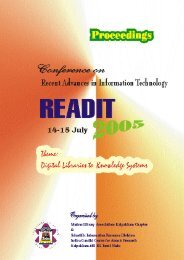READIT - 2009 - Indira Gandhi Centre for Atomic Research
READIT - 2009 - Indira Gandhi Centre for Atomic Research
READIT - 2009 - Indira Gandhi Centre for Atomic Research
You also want an ePaper? Increase the reach of your titles
YUMPU automatically turns print PDFs into web optimized ePapers that Google loves.
Proceedings of <strong>READIT</strong>-<strong>2009</strong>, Kalpakkam - 603 102, 29-30 Dec <strong>2009</strong><br />
6. No Discrimination against Fields of Endeavor - The license must not restrict anyone<br />
from making use of the program in a specific field of endeavor.<br />
7. Distribution of License - The rights attached to the program must apply to all to whom<br />
the program is redistributed without the need <strong>for</strong> execution of an additional license by those<br />
parties.<br />
8. License Must Not Be Specific to a Product - The rights attached to the program must<br />
not depend on the program's being part of a particular software distribution. If the program is<br />
extracted from that distribution and used or distributed within the terms of the program's<br />
license, all parties to whom the program is redistributed should have the same rights as those<br />
that are granted in conjunction with the original software distribution.<br />
9. LICENSE MUST NOT RESTRICT OTHER SOFTWARE - The license must not<br />
place restrictions on other software that is distributed along with the licensed software.<br />
10. LICENSE MUST BE TECHNOLOGY-NEUTRAL - No provision of the license may<br />
be predicated on any individual technology or style of interface.<br />
WHY OPEN SOURCE?<br />
One of the Keystone Principles of the U.S. Association of <strong>Research</strong> Libraries states,<br />
"Libraries will create interoperability in the systems they develop and create open source<br />
software <strong>for</strong> the access, dissemination, and management of in<strong>for</strong>mation." (Keystone<br />
Principles, 2003, section 2.4). Many have argued that because of the principles of code<br />
availability and universal open standards, libraries and library projects are almost ethically<br />
required to use and develop OSS. Also many libraries, faced with budgetary crunches and the<br />
resultant lack of technological resources, have opted <strong>for</strong> open source solutions to some of<br />
their in<strong>for</strong>mation technology problems. It is frequently very inexpensive, if not free, and can<br />
operate perfectly well on older computers -- which libraries often have in abundance. Besides<br />
cost and flexibility, there are many other compelling reasons <strong>for</strong> libraries to make the switch<br />
from closed source to open source software, including software licensing (most open source<br />
programs are subject to much more lenient licenses than closed source programs, and may<br />
provide less legal hassles <strong>for</strong> the library), and open standards, which is an issue that many<br />
open source advocates and developers also grapple with.<br />
135<br />
3

















